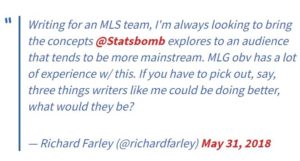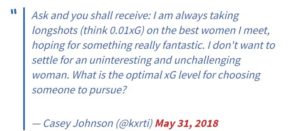Day Two. More mailbag. Let’s get to it.

I’ve done a lot of work with analytics for wider audiences, and there are a number of things I’ve tried to keep in mind over the years. The first is that you can’t make people learn things they don’t want to learn about. There’s a fundamental difference in the incentive structures for people who work within the game, and for fans who consume it. People who work in the game are obligated to try and get things right, or they risk getting fired and replaced by people who do it better. Fans are under no such obligation and they like what they like, and cheer how they cheer, and get invested in whatever they get invested in.
There are just large numbers of fans who will be perfectly fine with analytics when it tells them what they want to hear, and not interested in hearing about it when it tells them something else. That’s ok. They also won’t particularly be interested in learning anything about it, so anytime they hear arguments they don’t like they’ll be left critiquing the entire endeavor, since they don’t speak the language fluently enough to actually engage on the specific point. There’s just nothing you can really do about that.
Instead, I’ve always chosen to focus on people who are interested in stats an numbers and football, but haven’t been exposed to it before. And there are more of those than you think. It’s a cliché but I really believe in trusting my audience. At mainstream outlets I don’t expect them to know a lot coming in, but I don’t think readers are dumb. Stuff like expected goals isn’t complicated, and I think that’s really the point of emphasis for me; a focus on how analytics is just a slightly more numeric way of talking about concepts everybody already understands. People that watch football get the tension between taking lots of shots and taking good shots. They get the difficulty of figuring out which midfielders really contribute to buildup play, and which ones add very little while also being defensive liabilities. Analytics operates in the same places that normal fan conversations do.
Typically, I think the best way to ease audiences in is to present the evidence analytics provides as an additional point in an ongoing dispute. Is a striker struggling to score goals? There are a million ways to approach the question of what’s up. If he gives you a quote that says “I’m getting in good spots, and the ball just isn’t going in. I just have to keep my confidence up and the goals will come,” well that’s an xG argument. If a manager talks about how it doesn’t matter that his team didn’t have very much of the ball and gave up lots of shots, because they were all bad shots and besides our counterattack was great. That’s an xG argument, and a perfect moment to talk about how that stat can either support or refute what the manager is saying.
I’m always actively on the lookout for moments like that, places where the space between the work stats do and the way people inside the game are evaluating it is small. That’s a great place to start. Then I believe people who want to learn can pretty easily follow along from there.

Everybody who works in the field gets this question a lot. One good place to start is by narrowing down exactly what it is you mean by “analytics” because it’s a wide field. The work that’s done inside clubs is different than the work that’s done at consulting services, is different than the work that’s done in media. All of that is different than what being an interested and educated fan entails. There’s lots of overlap, of course, but the primary focuses of all those lanes diverge greatly. So, the first thing to do is try and figure out what being into analytics means to you.
I knew very early on that I wanted to be working on the media side. The through line of my professional career from poker to finance to football analytics has been explaining technical concepts to audiences that aren't versed in them. I’ve read baseball analytics writers for years, and had lots of experience watching how baseball, and then basketball, hockey and NFL coverage, could get better if people who understood statistical concepts were working to use them to explain the game to fans. I saw what heavily analytics informed writing from people like Jonah Kerri or Zach Lowe could do, and knew that’s what I aspired to do in football.
That informed the decisions I made. I focused on becoming a better writer, on reading everything I could and on making it a priority to write regularly even if only a few people were reading it. I learned a lot about how analytics worked, and how best to make that accessible to people less knowledgeable than myself. If I wanted to work inside the game all of that time would have been better spent learning to code. But I didn't. What I did was the right path for me, but I was able to take that path because I knew where I wanted to go. That's not to say you need to have your life figured out before trying to read an xG map, but just that if you're interested in being in analytics then what you should do is heavily predicated on where you want to end up.
And finally. I entirely wasn’t kidding when I said I’d answer a relationship advice question. Thanks for being brave enough to submit one.

Let’s start with the positive. Not settling is good. Looking to be challenged in life and love and relationships is a healthy, positive way to go through the world. There’s nothing necessarily wrong with shooting your shot and seeking romance with people you perceive as unlikely to reciprocate (provided you are, you know, not an asshole when it doesn’t work out). That said, the way you’re approaching your process sets off a couple of alarm bells for me.
Maybe it’s just some cutesy phrasing, because this is a soccer analytics mailbag after all, but I can’t help wondering why you start off believing that the best, most interesting, fantastic women are ones that you will have no shot at. I think it’s worth doing a little introspection on exactly what it is you're valuing, and how you're evaluating it.
If I may stretch this horrible xG analogy just a bit (because again, relationship advice in a soccer analytics mailbag). The process of figuring out how to measure shots has been a long and complicated one, and we keep learning stuff along the way. Shots we used to think were terrible have often times turned out to be more valuable than originally expected, and vice versa. I’d be wary of the way you are deciding who has value, and who will be a good long term romantic partner beforehand, and then deciding to pursue them. Also, pursue is a crappy word. Ask them out. Or hang out. Or whatever. If they don’t want to, that's fine, cool, move along. Life is short and there are many people under the sun.
It strikes me that what you’re doing now is forming an expectation of what future romantic partners will be like, and then evaluating both how attractive they are to you on a range of axes and how likely they are to be interested in you. But you're doing all that before factoring in what they are actually like as a person in the world. This is a really good way to end up romantically involved with people you think you should like and not with people you actually like. It also seems like a good way to convince yourself that nobody you like could actually like you back. This is not true!
Dating is hard enough. Meeting awesome people who you like and who like you and who you want to keep doing awesome things with forever is a stressful process. Trying to skip the steps of getting to know partners as people by figuring out in advance which of them would be great forever and which of them don’t make the cut doesn’t make the process simpler. You can’t know ahead of time which cool people are going to be worth it for you to bother to make the effort to get to know better. Knowing people casually is different than dating them. Dating people casually is different than dating them seriously. Dating people seriously is different than marrying them and on down the line forever and ever.
It’s important to seek romantic partners who are actual people, not who are people you’ve crafted from your imagination ahead of time. There’s no way to build a reliable expected love interest model from afar. If you’re interested in somebody it’s great to ask them out. It’s not bad if they say no. Sometimes they'll say yes and then it turns out they weren’t actually as cool as you hoped and that's alright too. Life and romance is messy. Liking people is fun. Loving people is great. Sadly, as nice as it may be to fantasize about, you don’t get to decide who you’ll like and love ahead of time.
